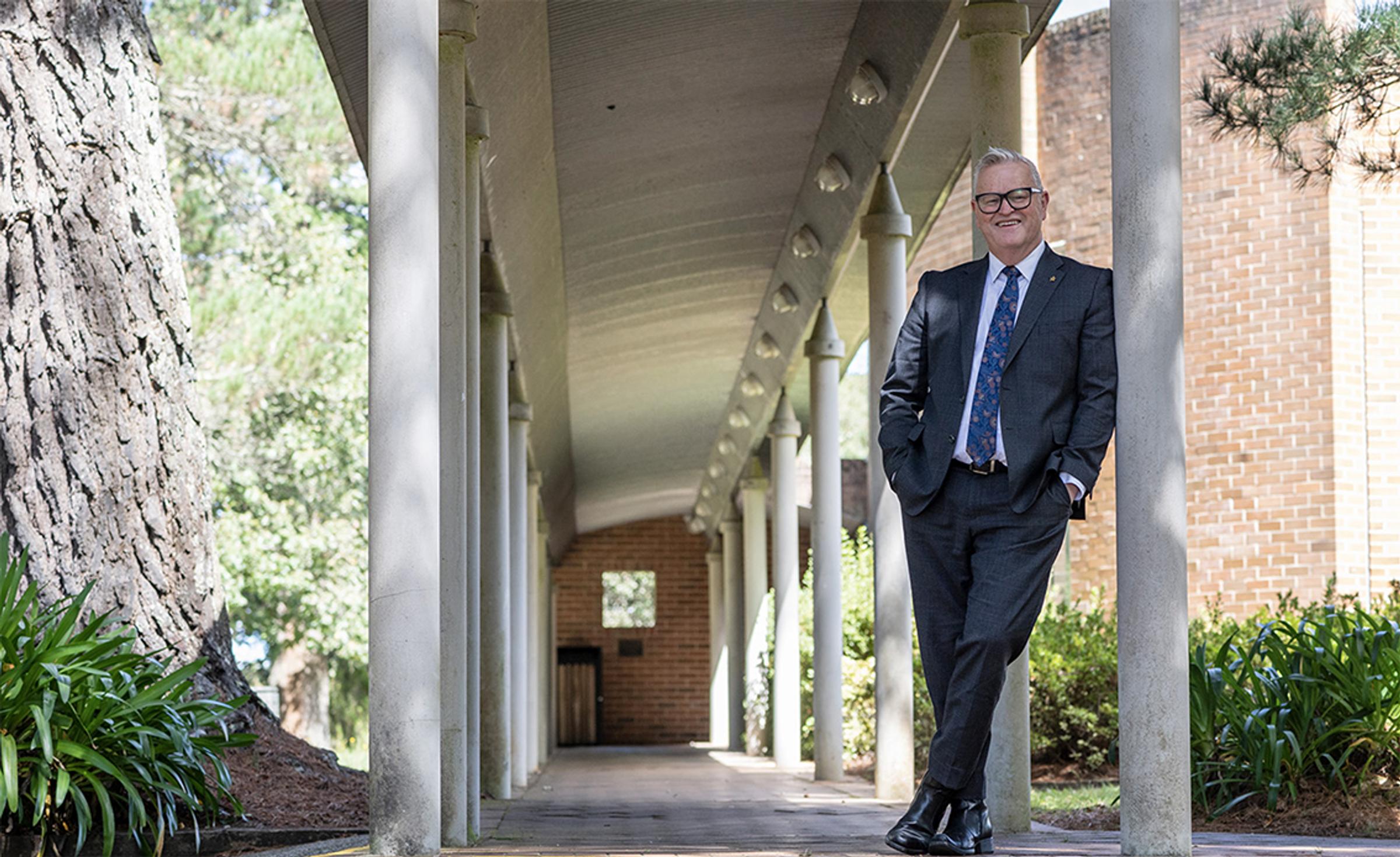From the Principal

For some time now I have been reflecting on how technology has impacted our communities, our relationships and the way young people engage with learning. There is significant research that is how technology is not only changing the structure of the brain, but also the impact of it is having on the emotional, social, intellectual, and physical development of young people. The impact on more mature brains is also cause for investigation. I am convinced that schools and parents must be better informed on this topic simply because if we do not step towards it, it will begin shape us. We are undertaking research in 2024 in our Odyssey program where we have blocks of time throughout the week where students are not required to constantly access technology.
John Rosemond, a recognised parenting expert, says, "the most important thing about children is to prepare them properly for responsible citizenship. The primary objective should not be to raise a straight-A student who excels in three sports and becomes a prominent brain surgeon. Our primary objective is to raise a child such that community and culture are strengthened." Recently my friend Chris Ivey shared some deeper thoughts with his community and I also share some of those.
My wife and I often joke with each other when we refer to one another as "Parents of the year." This is usually on the back of us having forgotten to attend a parent-teacher interview, remembered too late that we had an event we were meant to take our child to or, at times, leaving a decision to our children that were perhaps not equipped to properly make. We haven't always been perfect, but after 23 years of parenting, we've learned some valuable lessons. These have included reminding our children that every moment is not about them, having family meals together at a table, encouraging our children to own their place in a room but not having to fill it, planning, removing technology usage in bedrooms, and turning the internet off for extended periods. We have prioritised family time and holidays as well. We are convinced that these rules have helped us maintain a sense of order and calmness in our household with children.
More recently, I have noted Amy Morin, a psychotherapist at North-eastern University in Boston. Morin emphasises the importance of raising mentally gritty children who can handle setbacks and challenges. She helpfully identifies 13 common parenting practices that can hinder the development of resilience and mental strength in children, which are equally relevant for teachers and caregivers as well. These 13 include:
- Avoiding a victim mentality - Rejection, failure and unfairness are part of life. It is never pleasant and we try to create communities where it does not happen but we cannot control every moment of every day. We often hear children and adults say ‘It’s not fair!” - and often it isn’t, but also changing that is often impossible. Morin suggests the best thing we can do as adults and parents is to teach children that they can always take positive action, no matter how difficult or unjust the situation is.
- Parenting out of guilt - we often think there is more benefit in giving in after deciding to the contrary. This is actually unhelpful to young people. Children (and adults) need to be able to confidently say 'no' when appropriate. This allows them to make wiser decisions and helps them to more confidently take care of themselves.
- We should not make children the centre of the universe - if our choices and decisions always revolve around our children, they grow up thinking it’s normal. Children then behave as if the world owes them something. The research is clear that this leads to self-absorbed, entitled adults making who poor partners, work colleagues and community members. It is also interesting that from a biblical perspective, none were created for that sort of adoration. We were created to worship not be worshipped. When we create a high adoration focus on our children they will eventually feel disappointed when unrealistic expectations are not met.
- We should avoid fear dictating choices - It is natural and normal to want to protect our children, but we also need to let them take age-appropriate and responsible risks. By doing so they learn that fear or uncertainty is a necessary development experience. If we allow them to source courage by helping them face fears by stepping outside their comfort zones, they will better cope with uncertain environments. Start small and then they will learn to cope with and assess the bigger risks as they grow.
- Giving children excessive power over themselves and others is unhealthy for them - too often these days children are given too many options and chances to negotiate. For example, if children dictate what is for dinner or how family leisure time is spent, they are given more power than they are developmentally capable of handling. Treating children as equals robs them of developing mental strength. Instead, we should allow them age-appropriate choices that still maintain parental and adult authority ad leadership. It is healthier to teach children to follow instructions promptly, eat things they don’t like, and do things they don’t want to do. It is also better for them to limit their options. Few children in the Blue Mountains have starved because they have not eaten what has been generously prepared for them.
- Expecting perfection is not helping - high expectations are healthy. My wife and I always had high expectations. But we never expected perfection. My encouragement is to let you children fall over and also fail. This is completely normal and healthy! Help children strive to become as good as possible is actually better than pushing them to be better than everyone else. This instils that self-worth that is not dependent on how they measure up to others.
- Don't allow your child to avoid responsibility - As mentioned, my wife and I have always expected our kids to be responsible for themselves and also act responsibly. Sometimes it is easier to just do things for them - make their lunch, pick them up, drop them off, make their bed, tidying up after leaving a mess. And sometimes we give into the temptation of letting our children be carefree, because they are playing happily in that moment. But doing age-appropriate tasks at home as part of family life doesn’t burden children; rather, it gives them the mental strength to be good citizens, partners and parents.
- No need to shield children from pain - Hurt feelings, sadness, and nervousness are a part of life, and experiencing painful feelings gives us the chance to learn how to tolerate discomfort. It allows students to develop the ability to be empathetic as well. This is often how we learn best. Children need guidance and support to deal with negative emotions so they can handle life’s inevitable hardships.
- Feeling responsible for children’s emotions - When parents pander to sadness and tantrums, we unwittingly take responsibility for regulating our children’s emotions. However, children need to develop emotional competence and learn to manage their feelings. Proactively teach children healthy ways to cope with emotions so they are not dependent on others to do it for them.
- Preventing children from making mistakes - Natural consequences are some of life’s greatest teachers! Let children ‘stuff’ up sometimes (e.g., forgetting their homework, lunch or PE gear) so they can learn from their mistakes and become stronger and wiser.
- Confusing discipline with punishment - Punishment is about inflicting suffering; discipline is about teaching children to do better in future and make good choices. Imposed discipline leads to self-discipline, and consequences help children develop the self-discipline to make better choices.
- Taking shortcuts to avoid discomfort - Giving in to whining, nagging or an emotional outburst might make our lives easier in the short term, but it is not good for our children in the long term. We must model delayed gratification and show children we can resist tempting shortcuts. This helps our children become strong enough to persevere when it’s tempting to give up.
- Losing sight of core values - The demands of day-to-day life can cause us to lose sight of the big picture. We need to make the effort to ensure our priorities reflect the things we value in life, like service to others, intellectual and spiritual curiosity, and a desire to always be truthful to ourselves and others.
Blue Mountains Grammar School has always considered itself a collaborative partner with parents. Our school values the strong relationship between the school and families, and we are committed to working together to support the educational journey of every student. We believe in our collective experience to share expertise and provide valuable insights to parents, empowering us to raise young people who will confidently contribute to their community and culture in the future.
Steven Coote
Principal
